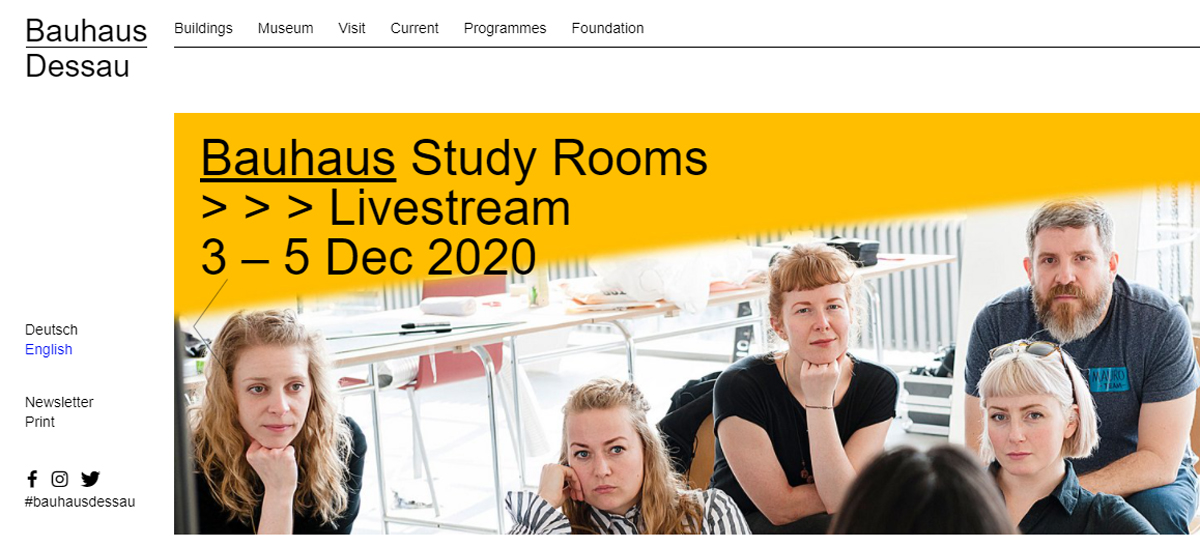Submitted by Pappal Suneja
Bauhaus Dessau Study Rooms: ‘Habitat’: Live Stream via YouTube
Germany Architecture News - Dec 04, 2020 - 21:20 4056 views

The Academy of the Bauhaus Dessau Foundation currently runs three different educational programs in the field of Global Modernism Studies, each with its own profile: the "Coop Design Research" MSc program, which is jointly organized with Anhalt University of Applied Sciences and Humboldt University Berlin; the "Bauhaus Lab" research program, which focuses on selected individual Bauhaus objects; and the "Bauhaus Open Studios", a short-term residency program at the Bauhaus building geared to international design universities. Year after year, over one hundred people from all over the world are directly involved in the various program lines. Through their respective transitory presence in the Bauhaus building, they inscribe themselves in this historical learning environment, perpetuate its history and become part of an effective network of learners. In 2020, the Bauhaus Dessau Foundation has chosen to temporarily synchronize the various programs with their different rhythms, durations and temporalities and to bring them together in a common Study Room.
Referencing the study rooms of museums and archives, the Bauhaus Study Rooms are conceived as an opportunity to intensively engage with the annual theme of the Foundation, and to consider it decidedly from the perspective of the three programs. On the other hand, by the time spent together, the aim is to transform the Bauhaus building back into a temporary learning place, which also allows exploring and experiencing the conditions of collective knowledge production. Each edition of the Study Rooms is a test run for the subsequent one, and gives the opportunity to continually adapt and further develop the format.
A brief introduction to the theme of 2020: Habitat
Why are architects in the 1950s investigating anthills? Why are they conducting studies of the social structures and building methods of African communities together with anthropologists? What is the purpose of an exhibition on the tent structures of nomadic peoples in the Museum of Modern Art in New York, the capital of modern Western design? And why is informal building in Lima so fascinating to Western architects that they refer to it as an "architecture that works", since such settlements were previously considered slums that needed to be cleaned up? Why are these positions and projects from the 1950s again relevant today, and must be reassessed in the context of the current discourses on the decolonization of design?
Post-war modernist debates on how to reconsider architecture as a practice that creates community are mostly revolving around the notion of Habitat. These discourses thereby distance themselves from the uniformity and dogmatic character of Western functionalism, the Bauhaus and the International Style. After all, the post-war order was determined by novel social dynamics and geopolitical realignments: the rise of the middle class, the triumph of mass consumerism, the Cold War, and the de-colonial movements of the Global South also shaped the way in which architects now thought about building and design as a practice of organizing communal living. At the core of the concept of Habitat lies a radical change of perspective: from the sociology of housing to an anthropology of living conditions, which in some cases initiated a de-colonization of architecture and design, but which has only today become a truly global phenomenon. The debates on the notion of Habitat initiated an epistemological change in the way designers perceived themselves.
In this first edition of the Bauhaus Study Rooms, designers and architects, design researchers and activists pick up these historical threads of criticizing and revising hegemonic Western design ideologies for modern living. They reposition the discourse on Habitat in the context of contemporary discussions and practices of decolonization. To explore the profiles of the participants, Check this link.
Schedule for Today, Saturday, 5th Dec 2020 (Time slots as per CET)
|
|
|
|
|
|
|
|
|
|
Summary about previous sessions can be checked at Live Blog : Andino by Valentina Buitrago, a Colombian product designer and design researcher based in Berlin. The YouTube Link of the Foundation can be checked for updates and recorded Sessions.
Head Image: Workshop during the Festival School FUNDAMENTAL, Bauhaus Building, Dessau, 2019. © Bauhaus Dessau Foundation. Image: Thomas Meyer / Ostkreuz.
> via Stiftung Bauhaus Dessau
